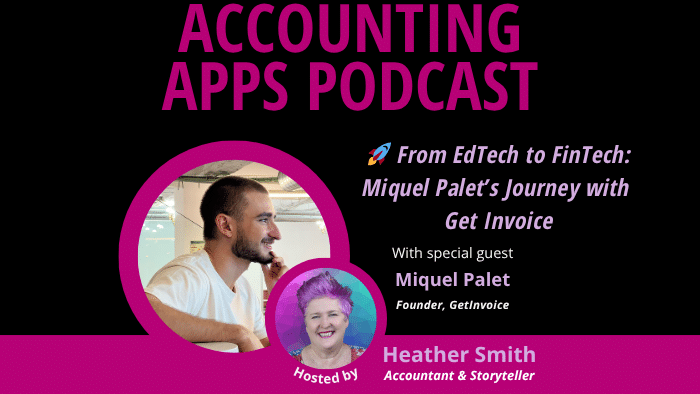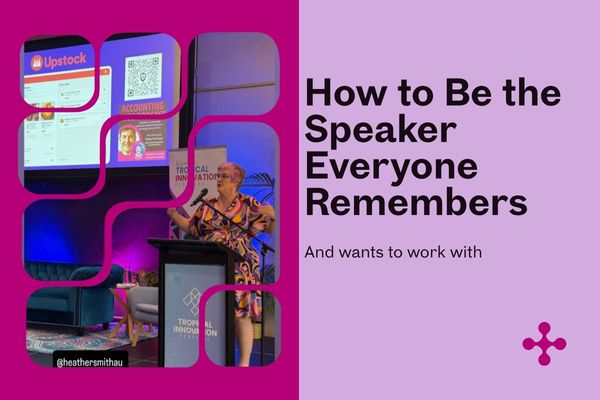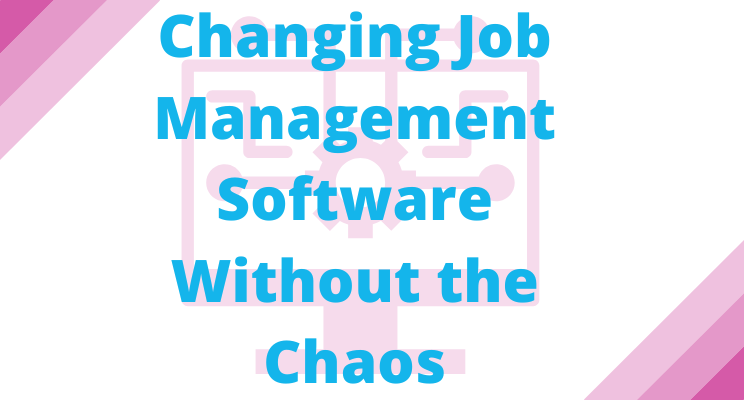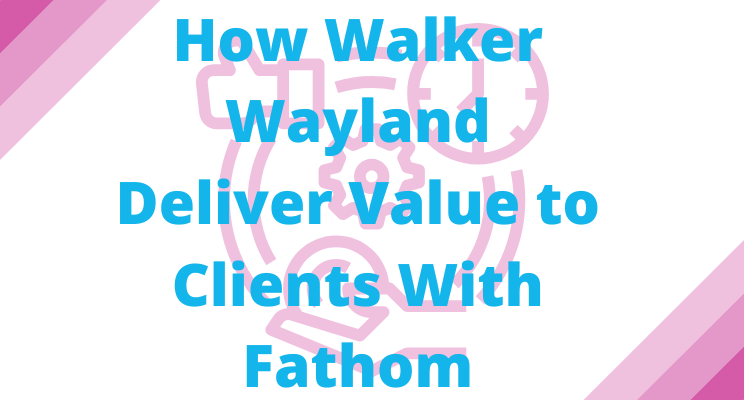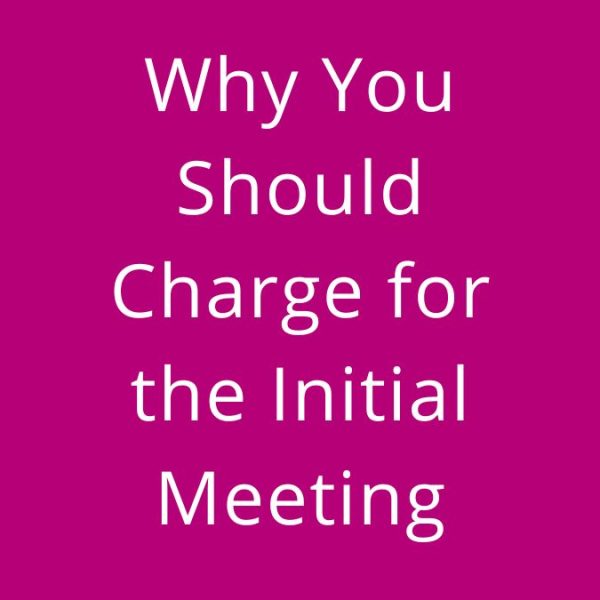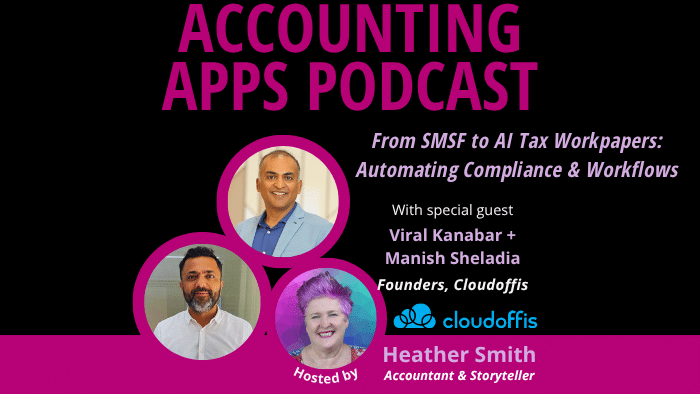“This is the advice we give to all of our clients. Get the business name nailed, get the business name registered under your umbrella or whatever organisations you are, do that super quick, so you don’t lose that. And then immediately go through all the socials and grab all of that name everywhere.” – Alexi Boyd, Small Biz Matters
Today I’m speaking with Alexi Boyd Director of a Bookkeeping business and host of the Small Biz Matters podcast. In this episode, we talk about . . .
- Insights into how she runs her small bookkeeping practice, supporting micro and start-up businesses.
- Navigating a dislike for implementing and adopting new technology
- How curiosity, a growth mindset and a chance encounter with a radio station manager, was a catalyst for starting her podcast.
- How podcasting has helped her develop active listening and multi-tasking skills which she’s brought back into her bookkeeping business
- Useful tips for curating and facilitating panels, and why the CEO should not be hosting panel facilitations.
- Why it’s important to get involved in small business advocacy
Can you share with our listeners a little bit about your background?
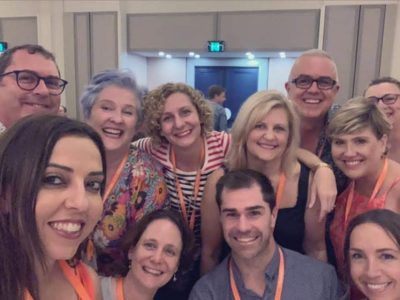 Alexi: Gosh. Which hat do I wear? Hi Heather, and thanks for having me on your podcast. I’m also intrigued and very much looking forward to the next little while. I guess I started my radio show, Small Biz Matters, about nearly or over seven years ago now. It started out because I felt that nobody was really speaking for small business in our area. There was no Economic Development Office of the council, and the Chamber of Commerce was a bit of a dead duck at the time. So, I thought I’d like to advocate for small business in this way through my community radio station.
Alexi: Gosh. Which hat do I wear? Hi Heather, and thanks for having me on your podcast. I’m also intrigued and very much looking forward to the next little while. I guess I started my radio show, Small Biz Matters, about nearly or over seven years ago now. It started out because I felt that nobody was really speaking for small business in our area. There was no Economic Development Office of the council, and the Chamber of Commerce was a bit of a dead duck at the time. So, I thought I’d like to advocate for small business in this way through my community radio station.
Alexi: I’m also a BAS agent, and I was getting really curly questions from my clients that I couldn’t answer myself, so what better way but to ask an expert live on radio for the answers to my clients’ questions? So, all along the way, this has been a real learning curiosity exercise for me, as well as I think meeting a need for the business community, as well. I’ve loved it. It’s just been awesome. Now it’s grown from me asking the local lawyer or HR consultant a couple of tiddly questions. Now I broadcast all Australian government agencies, like the Australian Tax Office, the Australian Bureau of Statistics. They see it as a real opportunity to do a long-form conversational, in-depth discussion about what they do.
Alexi: And really singing their praises, because I don’t think there’s enough out there for government agencies and all the hard work they’re doing to support small business. My attitude is let’s get it out there, let’s find out how small business can benefit, let’s make it educational and see where there can be a mutually beneficial relationship there.
Heather: Yeah. It’s interesting because both you and I are really into the long-form and some people… They may come and speak to you about this as well, but they’re like, “Oh, people can only cope with 90 seconds.” I’m like, well, my opinion is yes, some people can only cope with 90 seconds or 140 words, but other people can cope with long-form, and people have different phases in their day and in their week, and they are able to cope with this long-form, and I totally buy into what you’re saying in that these government organisations, they sometimes need assistance unpacking what they actually do.
Can you briefly describe your journey to starting Boyd Office Management Services?
Alexi: Sure. It’s a bit interesting, actually. I have been running my husband’s business, who’s a video production company, for the last 20 years. He’s always within under his own steam, so along the way I’ve been doing his bookkeeping and his BAS work, ever since day dot, as well. Then I went from working in media into a marketing agency where I was an office manager for five years. Again, learning the ropes as the company grew from 4 to 20 staff, doing all the processes and the payroll and the admin, the bookkeeping, the BAS work associated with them, as well.
Alexi: I guess I happily left that position to start my own practice and took all of that information that I had with just those two clients, and now it’s grown from a couple to multiple clients, dozens and dozens. But I really specialise in the micro. I do the little guys. I love watching startups grow and also helping them get started from the beginning into a process that’s really super-efficient, and it’s going to make their life easier from the get-go. That’s my sweet spot.
How are you actually able to start your own small business, by first having an interest and then leaning into that interest from your history and from your past experiences?
Alexi: Yeah. I think another big aspect, another plug into that history has been very much the teaching. I don’t think, because I started my career as a high school teacher, and very quickly burnt out because it is hard work. And I think as I learn and grow my knowledge of the local and international community of bookkeepers and accountants, I think it’s fascinating to hear how many people have got that little plugin of some sort of teaching experience. Whether it be coaching the local team, or whether it actually be a full-blown teaching qualification and experience with that. It’s really interesting to see how much teaching and imparting knowledge is a part of BAS agents, bookkeepers, and accountants’ journeys.
Heather: Yeah, absolutely. And that whole educating them in what they’re doing, and I do think that that assists the whole process in terms of both working with them, but enabling them to grow.
Alexi: Exactly.
What technology or accounting apps are you actually using in your business as a small BAS agent, bookkeeping practice?
Alexi: Oh okay. This is really interesting because I imagine that most of the people you interview have probably got a suite or a number of plugins, or an app stack. I don’t really have that. I am probably process-driven to a fault. So, I find that when implementing technology or implementing a new piece of software or a process, which is invariably going to be tech-based, I really am so finicky about its implementation that it takes forever.
Alexi: That makes me shy away from new tech. I’m more likely to stumble on something and go, “Oh, that seems to be working” and then grow it myself, like an Excel spreadsheet, or like a Google Sheets, rather than going, “Okay, here’s an entire, all-consuming practice management software solution that I’m going to plug into my business.” I actually find that sort of thing so overwhelming to implement. I’m not sure if that’s a personality or a process thing, or maybe it’s just the world in which we live as accounting professionals, but there’s so much choice out there that for some of us it can be quite an overwhelming process to implement.
Have you faced potential adversity when adopting new technology?
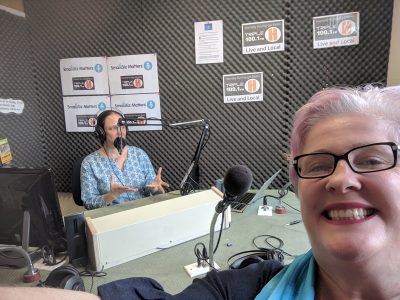 Alexi: I’ll admit, it’s a block. Like, it really is. The thought of someone going, “This is the solution that’s going to meet all of your needs” and I think, “But I am so unique and the way I work is so unique, how could you possibly meet all those needs?” And invariably, the couple that I’ve tried have failed in that regard.
Alexi: I’ll admit, it’s a block. Like, it really is. The thought of someone going, “This is the solution that’s going to meet all of your needs” and I think, “But I am so unique and the way I work is so unique, how could you possibly meet all those needs?” And invariably, the couple that I’ve tried have failed in that regard.
Heather: Yeah. That’s really interesting. I think it’s really useful for the community to hear that, and have you unpack that for them. I’m sure that other people are feeling exactly the same way, are feeling absolutely exactly the same way, and it’s kind of like, “Which way do I focus?” And you’ve gone curiosity, growth mindset, and it’s very much those soft skills ways, in that communication with your clients’ ways, and not in the actual adoption and implementation of the accounting apps.
Alexi: Yeah, it’s funny, as well. It’s interesting you should say that about soft skills because that’s obviously my forte. I find that particularly firms that grow really fast, and I’ve seen this from the inside when you’re a BAS agent, you almost get a little bit of inside knowledge of how accountancy practices work. Sometimes they grow so fast, because of the implementation of the software, that they lose connection with their clients altogether.
Alexi: They literally go, “I’m not even to call you once a year. Here’s the singular method of communication I’m going to have with you. It’s through an app and it’s through an eSignature function, and I’m not going to talk to you about what I’ve done.” If anything else, that’s another reason that moves me away from those solutions because they remove you from that relationship that you have with the client.
Heather: That’s really interesting. I know you, and we’ve talked extensively about this, that you actually have really strong in-person relationships with your clients, and must be a great asset and a great resource to them, for that.
Alexi: Yeah, and to a fault.
Heather: Well-
Alexi: Goodbye weekends.
What conversations do you have with your clients about them using technology in their business?
Alexi: You know what? It’s really just the conversations that I have with staff that I’m comfortable with. If they’re going to implement a piece of technology and I go, “Oh, my God, I haven’t used that before,” I’m not going to dissuade them from it, and if it’s obviously something that’s industry-specific like a Cliniko or a Timely that helps them manage their appointments and helps them deal with a whole lot of other medical stuff, I’m not going to make them not, but I just think to myself, “Oh, I’m going to have to learn this. I’m going to have to learn how this works with my main platform” which for myself is Xero. “I’m going to have to figure this out.”
Alexi: And to me, again, it’s a hurdle. Not to say that I don’t ever shut those opportunities down for clients, but this is where being a bookkeeper BAS agent that doesn’t niche, so I don’t specific to one particular industry, so I might have one or two, people in the medical field, and I know that they use Cliniko so I’m now comfortable with that, but again, it’s happened through growth. It hasn’t happened because I’ve gone, “You need a solution.” I’m not the person who’s going to be delivering the perfect app solution for them, because I’m not running around researching and finding out all these different things, because I don’t niche.
Alexi: If I was just working with naturopaths, I could go, “I know the solution for your appointments, I know the solution for your accounting, for your receipts, and I’ve got this package.” But I think that’s one of the problems with not niching in a particular field.
Heather: I’m going to call you up on that. You do niche in micro-businesses, and you do niche in startups, but you don’t niche in a specific industry. There are different ways to niche and I know bookkeepers and accountants out there who will only take on an established business, that has a certain type of turnover. I know someone who will only take on 10 million turnover, full stop, and that’s it. That’s where her sweet spot is. Niching is very fascinating for me, and you said that at the start. “My niche is micro-businesses” and micro businesses need to know that person who understands them, and who’s willing to work with them, and can actually set them up for those efficiencies that you did talk about.
Alexi: Yeah, true. I have preferred apps. In fact, I have ones that are mandatory in my practice that the client has to use them, otherwise, I don’t take them on as a client.
Heather: Yes. Absolutely.
Alexi: There’s that option as well, but that’s really … Because I see them as the best solution for this problem that faces I know every single micro business and you can tell me that you’ve only got five receipts, but you don’t. You don’t. You have many more than that.
Heather: And so what you’re talking about, for those listening in, is a horizontal app. A horizontal app is an app that applies to all businesses, as opposed to the Cliniko which is a vertical app and only applies to a specific industry. Thus, if your niche in a specific industry, identify the app stack in that industry, but your niche in micros and it’s like getting those… The micro-businesses typically don’t want to spend much money. Want to focus on what they actually want to do, and so you’re identifying horizontal apps that will efficiently set them up and grow with them.
Alexi: And the implementation needs to be, “You have to use this.” And sometimes I have a little bit of a … I guess during my training because training with micro is a very important part of bringing them into your practice and onto the software. You just have to, you can’t just expect them to figure it out themselves. I have a great little training package that I do, but part of that training package is the inevitable conversation I’m going to have about, “Why should I have to pay for this?” I do a comparison of, “This is what happens when we don’t use the software, and this is what happens when we do, and see how I’m 10 times faster when we do use the software, and that’s why it’s mandatory.”
What can accounting apps do to help you deal with the implementation and adoption of their technology?
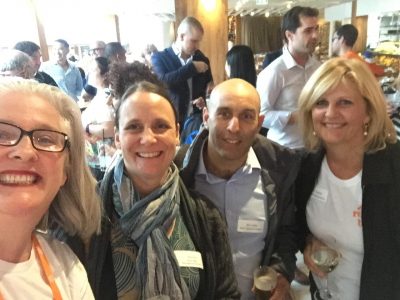 Alexi: I don’t know.
Alexi: I don’t know.
Heather: If we’re talking directly to them.
Alexi: That’s the million-dollar question, isn’t it? I would happily hand that over to them if I knew. I don’t know. Because again, they’re not dealing with robots. They are dealing with people who have different circumstances, different abilities to take on new processes, and different circumstances and different personalities. I actually don’t have an answer. I don’t have an answer to that question. For me, it’s a slow burn, so I’m thinking of the software packages that I do use and that is mandatory for my practice. For me, it was just I guess drip-feeding information.
Alexi: So, getting me started for a couple of clients first where I can test it out. I think there’s no way you can do this with someone who’s just started out as a BAS agent. I think you need a good three or four years of experience because they can immediately when you get a new client coming on board, you can start to say, “This package will work for them. This is how long it’s going to take. This is the sort of client and this is their behaviours that I recognise.” That’s what we get really good at when we’ve been bookkeepers for a number of years.
Alexi: I think it’s at that point that you can target those bookkeepers because they can recognise what’s going to work and what doesn’t. And then offering them the opportunity, not to just say, “Oh, we’ll give it to you for free.” Big deal. I can do my bookkeeping with my eyes shut. I don’t need help with my own bookkeeping. Give it to me where I can use two or three test clients, for free, for a number of months, not just 30 days. Let me play around with it, and then as I’m doing that, check in with me regularly, give me training videos for what I need, not for what someone who’s been using the software for a number of months or years has.
Alexi: And it needs to be almost a different stream of education for those particular people, but I don’t think anybody who’s new is ready to take something on. I think it needs to be someone with a little bit more experience, that you can start to recognise which of these clients can be beta tested with a particular piece of software or process.
Heather: Yeah. That was lots of great information and insights for the accounting apps who are listening in, and I am all for bite-sized education, micro education. And bringing it back to the 101. Go through and explain every single feature, just in a 3-4 minute video. And just put it out there and you can set up through a newsletter, drip-feed that education back into someone like yourself. I think there are special, intuitive campaign programmes out there that will actually go, “Bam. If she’s clicking on this, then give her that information. If she’s clicking on that, give her that information.”

Alexi: But it has to be backed up with a person. It needs to be top and tailed with a real human that you’ve got at the end of an email. Not necessarily at the end of the phone, but someone that knows you and is building a relationship with you. You cannot do this just straight-through machine learning or AI. It’s got to be done through human connection. In fact, if I smell it, if I smell AI in the equation, I’ll run a mile. Because it’s not there yet. It’s not human, people. Picking up the phone and saying, “How are you doing?” That’s human. And building a relationship with someone is going to give you the warm and fuzzies much more than a robot going, “Oh, I think you’ve done that so I’m going to assume that it’s this account that I’m going to post it to.” And you’re like, “No, that’s wrong. Again.” You need humans as part of the sales methodology.
Heather: Yeah. I agree. I have a list of maybe about 16 criteria, and the number one has to always be supported. That support, and how they deliver that support.
Alexi: Support in the country in which you live. Those time lags are huge. If you need to solve a problem now, because that’s when they work, being told that the team is … Or even worse, not realising the team is overseas, until 12 hours later, when you get a message at 3:00 a.m. in the morning responding to your email, and not even realising that, that needs to be part of your sales pitch. Having support staff based in the country in which the people operate. That’s a big sales pitch because people will get response times much faster. You need to be open and honest about that.
Alexi: I had a terrible experience with one of the apps. For my own practice, it affected me financially and it was awful. It literally came down to the fact that the support staff were not located in the country in which I’m in.
Heather: Yeah. Or getting that 3:00 a.m. phone call, realising, recognising you’ve got an urgent issue and going, “Are you serious?”
Alexi: “Wow, really? That’s great customer service.
Heather: It was an urgent issue but I couldn’t deal with it at 3:00 a.m. in the morning.
Alexi: Exactly.
Heather: Thank you for sharing that with us, Alexi. You’re also the radio host of Small Biz Matters.
Alexi: My baby.
Can you share with us a bit about the journey of starting your own show?
Alexi: Yeah. It’s quite a funny story. I had a business launch, it’s what you do when you have a launch, of my bookkeeping practice. And luckily because I was already entrenched in the community anyway, and doing stuff with the school, I was able to get them there, and the local state MP to come along to the opening. When you do that, you want to actually get warm bodies there, as well. Lots of people there, and I told the media, and I brought along the station manager of Triple H, and I did my speech.
Alexi: She said, “You should do radio.” I was like, “doing radio? who does…?”.This is long before podcasts, might I add. “Nobody does radio. It’s so daggy.” And then for the next two weeks, my husband was like, “You need to do radio. You can talk underwater. This is a great opportunity, you need to do it.” He convinced me to do it, and I started by piggybacking with a couple of the breakfast boys, which meant it was a very 20-something show, but they were great, and they really brought an interesting perspective to it. And then gradually over time, I started hosting and panelling for myself and when you do community radio out there, you do everything. You are a tech person, you are IT, you’re your own producer, you do pre-production, post-production. You do it all yourself.
Alexi: It’s all about that perception, I think, as you grow you get better at looking as though you are a group of people. Not deliberately, but over time you get your processes and procedures nailed, and you have email signatures and things like that to try and make yourself look more professional which is really important. But it’s funny that is just sort of started out, “Oh yeah, I’ll jump on board with the breakfast boys on Tuesday mornings” and now I run my own programme. It’s one of the really high profile shows for the studio and for my radio station.
Alexi: And it’s funny because I had some advice come to me from a very high profile business leader recently who said, “You’ve got to run away from community radio. You’ve got to stop making it all about that. You’ve got to make it more of a business that you’re running.” No, why can’t I be both? My heart, my soul, the reason why I exist, is because of community radio. They gave me this opportunity, I’ve given them hundreds and hundreds of hours of my time, and I’m not going to leave that because it looks more commercial if you’re not with community radio.
Alexi: It’s been a really interesting balance between recognising this is volunteer, largely, and then how to commercialise it without making it icky. I didn’t want to go for the pay per listen, model. In the beginning, I didn’t want to put any ads. I didn’t even want any ads on the website. I just wanted it to be all about education, for it to be free and available. And then over time, you get frustrated and you think, “What am I doing? I’ve been doing this for so long. It’s got a great following, it’s got a great profile, it’s got great credibility.
Alexi: Surely there’s something I can do with this without making it look icky” and that’s where I’m at with my journey, is trying to commercialise it without taking away from that community feel. But it takes time. It really takes time to massage that product and find a way to make money from it without making it Macquarie Radio.
Heather: So there was a number of things in there. First of all, I never have ever heard of anyone having a business party launch and getting the state MP there and the mayor there. That was very impressive of you.
Alexi: I also had free food, and it was catered by my mother. So, it was a fun night, and I think that that’s why I’ve become so passionate about advocacy and building relationships in the community, which also involves getting involved with politics and getting involved with the council and that sort of thing. I think it’s important if you’re going to do something like a business that you involve them in it. They love it and it also brings credibility to what you’re doing.
Has hosted the radio show helped you develop skills that you’ve brought back into your bookkeeping world?
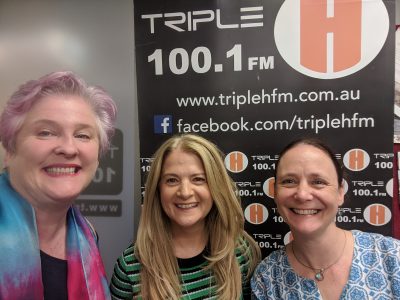
Alexi: Yes. I used to be a really crap listener. I used to just talk over the top of people all the time. Like, I have vague memories of being in networking meetings and not actually hearing somebody else’s voice while I talk at them for 15 minutes. I think it was my mom who started saying, “You’ve got to have breaks in what you’re saying so people can respond.” It was almost like really blunt like that, and she was absolutely right. I think what radio teaches you is to stop and listen, and oh, my God, you become the most amazing multitasker, because you’ve got to watch the tech side. You’ve got to watch what’s going on in terms of timing, community service announcements dropping in.
Alexi: You’ve got to listen to what they’re saying, think of your next question which you had pre-planned, but then throw that away because they’ve just said something really interesting so you need to massage that a little bit and bring out that really interesting piece of information that they just said. Or maybe dive down an entirely different rabbit hole altogether, and make sure that you’ll do time. So, all those skills took me three or four years when I realised, “Oh, my God, I’m really good at this. That is a real skill set, to listen and be thinking and be planning, and be time managing all at the same time.” I don’t think any other meeting can give you that, plus the pressure of being live on air, as well.
Alexi: I think what that’s brought for me is the ability to stop and actually listen to what someone’s saying and respond to what they’re saying, not respond in a way that I think is going to solve their problem before I’ve even heard what the problem is.
Heather: Absolutely. I actually sat in on a webinar of the New Zealand award-winning partner practice, I’m not sure exactly what they won, but anyway, and they said the number one thing that helped them improve was going on an active listening course.
Alexi: An active listening course?
Heather: Yeah, but that’s exactly what you just described.
Alexi: Is that just walking into a room with some gaffe tape over your mouth?
Heather: But you’re actively listening. You just unpacked what active listening was, which was actually listening and then massaging your response to them.
Alexi: I’ve got a much cheaper option. Take yourself down to your local community radio station, because there’s over 350 around Australia alone, and offer to do some radio co-hosting. They love having co-hosts, and you can probably bring a little bit of a flavour to the radio station in programming they haven’t had before. Like I said, every single one of us who are accounting and bookkeeping professionals are teachers. You just don’t realise it, and nobody’s listening. It’s community radio. So, you can get out there, you can say what you need to say, you can practice for ages and maybe build a following and maybe build a community out of that, as well.
Heather: Yeah, absolutely. But it’s really interesting that you have identified a number of skills and those soft skills are really difficult to practice, and that’s what you have developed. I know, like I’m sitting here with all my questions written out in detail, but I know that you don’t do that. You very much can absorb. I’m old, I’m going to say I’m old and I can’t think … I’m not as quick and as sharp as you, Alexi, but you very much listen to the response and then throw it back at them what the response is.
Alexi: Well, I think it’s interesting because if we are talking about people who are interested in going down this path, my methodology is for a 30-40 minute programme, you’ve got four main questions, and then underneath that, there are bullet points. No more than that. I call it a scaffolding script, so there is no actual long-form scripting. I actually say to my guests, “I’m going to give this to you. This is going to be what we’re going to be talking about, but don’t bring it in with you to the studio. I don’t want you to have any notes.” You can have statistics if you’re like me and you can’t hold that sort of information in your head. But don’t have the actual notes.
Alexi: I will guide the conversation, don’t worry, and if there’s something you’ve forgotten, I’ll remind you, so it’s all good. Actually, be confident in the fact that you’re the expert. I interviewed someone from the Australian Tax Office, one of the deputy commissioners who was very nervous but going on stage with me, and I said, “Well, let’s do a little prep interview first and we’ll record that.” He did it, and I said, “Okay, put away your notes. Go get a cup of tea. You know your stuff. Don’t worry, I will only ask you what I’ve just asked.”
Alexi: The main golden rules are don’t over-prepare, but never put anybody on-air dry. So, never put anybody in the seat in front of you with a microphone, with no prep. Even if I’m doing vox pops at an event, it’s one of the things I’m doing just went exploring, back in the days when we had events. I’d go around and I’d do little interviews, mini-interviews with people. I wouldn’t just shove a microphone in their face. I’d go, “Hi, this is me. Would I be able to ask you some questions about this, this, and this? How do you feel about that?” They generally give me the answer and I go, “Great, let’s just do that. I ask you that question, you give me the response” and then they ease into it a little bit. You can broaden out the conversation a little bit more. It inevitably turns into a 10-minute interview before you know it. People are a lot more confident than they think about what they know. It’s about creating the scaffolding questions to draw out of them those details and what they want to share.
Heather: Oh, we just got a masterclass in being on a panel then. Thank you for that, Alexi. Yeah, no, that was amazing, and thank you for sharing that with us. I also try when I’m speaking with people, if they get very nervous, as you mentioned, give them an outline of what’s going to happen. I had this one situation where there was a panel, there are three people on the panel, and I hadn’t told them not to refer to their responses. One of the persons referred to her response, but she answered, when I asked question one, she responded with her response for question two. And it followed the whole way through, and she could never realise she was never responding to the right question.
Alexi: Wow. So she just memorised what was in front of her, but got out of sync?
Heather: Yes.
Alexi: Wow.
Heather: It was very difficult, because it was like, “Oh, what a surprise. I’m just about to ask that question that you just answered.”
Alexi: “How can I segue to my next question?”
Heather: Every single time. Yes.
Alexi: Exactly.
Heather: But it is very much, so for those people listening in, I see the immense value and I’m constantly stressing this, in having panels with people on that resonate with the audience and having that real-life experience and insights that resonate with the audience, and we understand that those people who are potentially on a panel may not be experienced public speakers, but I in some way think my role as a facilitator, a moderator, is to make them feel comfortable. So I can get that insight out of them… And while they have their value as well, the speakers who are at every single event speaking, may not necessarily have that raw in the trenches experience.
Alexi: Yeah. I mean, we could do an entire podcast all about putting together the right candidate, because it’s not always the obvious people and it’s not the CEOs of the organisation. And certainly, it always should be moderated, professionally moderated. I might be singing my own trumpet here, but we know the difference between going … You can see when people are walking on the stage, and they look like deers in headlights, because they don’t know what they’re going to say, they haven’t been told the questions in advance. That’s just rude. And they’re not actually being given an equitable and fair discussion.
Alexi: Invariably, people like me who don’t shut up, will take over a panel if you’re a guest, and the other two people won’t get a word in each way, and no more than three people on a panel. Please, don’t over stack your deck, because then you definitely don’t have an equitable discussion. I once went to a networking meeting which had 10 people on a panel and went, “Oh, this is going to be interesting.” Let me just pick from their body language who we’re not even going to hear from at all, and I was right.
Alexi: I think a good moderator can read body language, can make someone feel comfortable, and prepared, can provide them with the … They take the responsibility away from time management, from people dominating, and it’s not because they need to dominate. It’s because that’s their personality. I actually have tips. I actually have body cues that I use, which I will tell people, “If you’re rabbiting on for too bloody long, I’m going to do this.” In fact, I’ve had some people come up to me before the panels and go, “So what was that thing again you’re going to do when I go on for too long?” Because they recognise it in themselves.
Alexi: People ultimately are lemmings, right? And we need structure. We’re like school kids in year three, who always appreciated that teacher who was really disciplined with the class, right? We’re still that. We still appreciate structure and form, and it gives us comfort. Then with that comfort comes the independence and that, and the self-esteem and the confidence to be able to speak clearly.

Why can’t radio hosts simply get their CEO to moderate the panel? (You pre-answered my question.)
Alexi: I did. Oh, my goodness. I have a great analogy for this. A dancer doesn’t make a choreographer, doesn’t make a teacher. They’re very different skillsets, and there is an assumption that people who have risen to the top of their field or to the top of the company or are a founder, made this amazing company beneath them, have not just the ability to speak, public speak, which vast majority of them do. But to curate a conversation, it’s a different skillset. Speaking in front of a PowerPoint presentation, or a TEDx Talk is one skill. Speaking on the radio in a conversational way is another skill.
Alexi: Moderating a conversation is another, and I think what I say to people in my little schpiel before I come on, is that… If I’m selling myself to an event organiser, I’ll say, “The best panel moderates are ones who cannot remember a thing that they’ve said. If you’ve remembered anything I’ve said during this panel moderation, then I’ve failed as a moderator. It’s not about me.” The CEOs make it about them because they get salesy. That’s their nature. That’s how they rose to where they are. I think that that’s a really important distinction.
Alexi: You wouldn’t get, in your own field, you wouldn’t have your sales staff suddenly going out and doing the books, and doing the accounts, would you? So why would you assume that in this regard, that you are not only a public speaker but a moderator? It’s a very different skillset.
Heather: Completely agree with you. Completely hate it when I turn up and the CEO has taken on the role, and you hear more from them than the actual people and you’re like, “Why have you done that?” And to the people out there who are thinking they want to do the panel moderation themselves, and I would say if you actually get a moderator in, they’re able to surface great things out of you, and you’re going to have more time to shine with a moderator, a curator such as yourself, on the panel. Facilitating the panel.
Alexi: That’s right. And it’s not only facilitating the discussion, but it’s facilitating the sale. It’s making people appear or they are, but positioning them as experts in their fields. That’s how you sell.
Heather: Yeah. You don’t want the moderator doing that about themselves. It’s icky. You can bring back the term icky. It doesn’t-
Alexi: Yeah, it rubs people the wrong way, and people smell it a mile away. A mile away. There are different ways, there’s body language and there’s stress, and there are different ways that you can do that, where you are in control, but you’re not the highlight of the event.
Heather: I spent probably from the ages of 17 until 22 waitering, which I got to the level of silver service waitering.
Alexi: Oh, wow.
Heather: Very fancy. Very fancy. My goal was you didn’t know I was that, just as the same with moderating. If you didn’t notice me being there, then I had done a really great job, but it was … I was always there but I’m never there. I call myself the Mary Poppins of support, in that, I’m there when you need me, but then I’m not there when you don’t need me.
Alexi: Yes, with the umbrella.
Heather: I pop in and empower you.
Alexi: The first time I met you, I remember you looked like a drowned rat with the accounting because you rocked up to my stand and you were drenched. Not so Mary Poppins that day.
Heather: My umbrella had been stolen, the chimney sweep. So, Alexi, you run two different yet complementary businesses.
Alexi: Three.
Heather: What advice … Pardon me?
Alexi: Three.
What advice do you have for someone listening in who’s thinking of launching a new business? What advice do you have for them?
Alexi: Colour coding. In your calendar, colour code what appointment is to do with which business. I think it’s too hard. People go, “Oh, I chunk out time for my different businesses.” Yeah, that’s not happening with me. I’m just all over the place. Being really, really clean with your emails as to which email address you are communicating with them in. Like, which stream. And sometimes that requires two different email platforms. I’ve got my three businesses that work in Outlook, but I’ve also got my personal emails that I run in Mac Mail, just so they don’t get muddied.
Alexi: Sometimes it does mean forwarding things about a little bit. What I’m saying is be really clear about your processes so that you don’t cause confusion. That can be difficult if there’s a little bit of overlap, or if you’re in the process where you can see … I guess a good example of that is Small Biz Matters radio, and then the conversation curator which is the work that I do with panel moderation and interviews like this, which is the professional one. And obviously, it started like this and then slowly it started to diversify.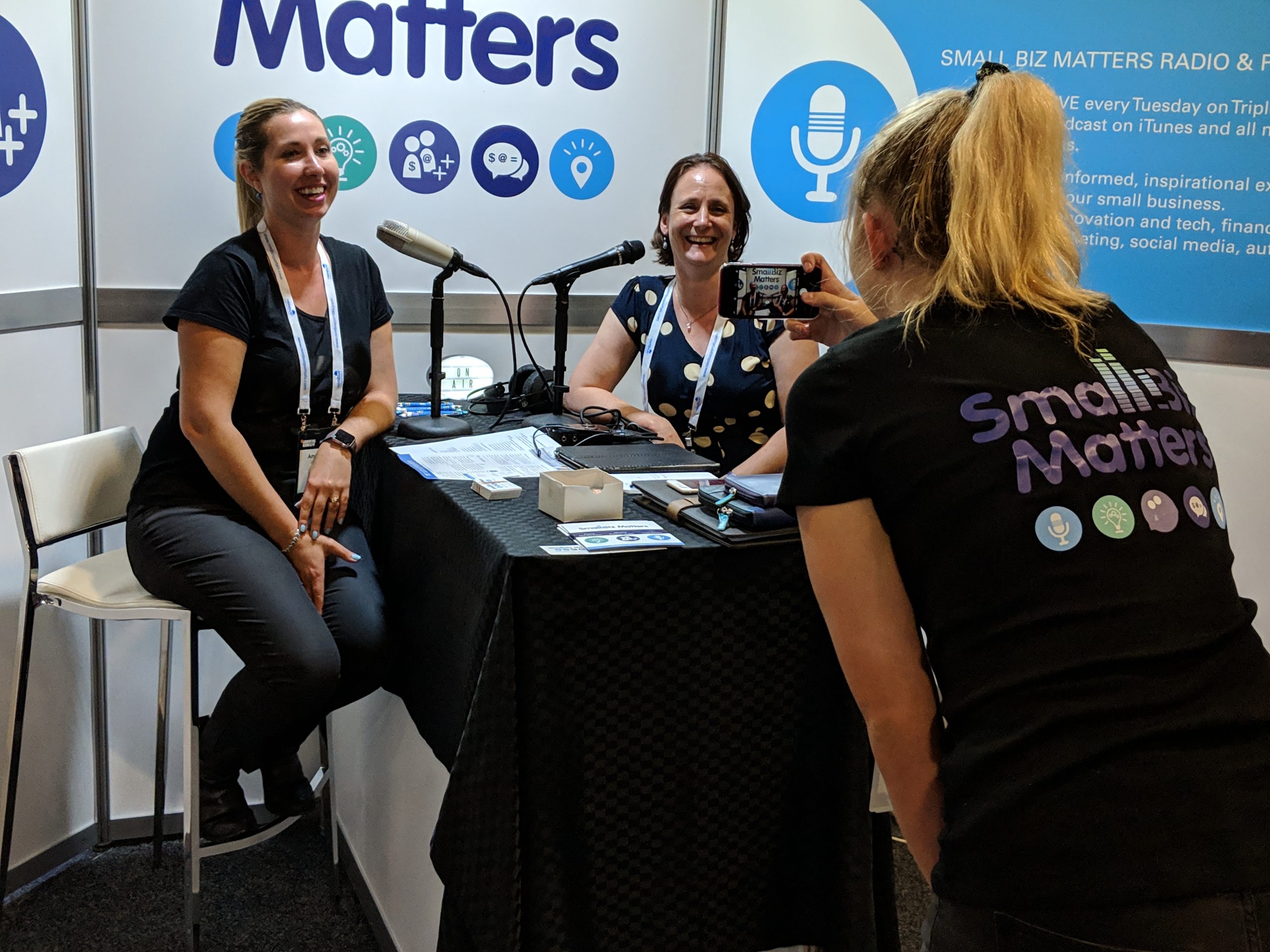
Heather: For our podcast listeners, Alexi has clapped her hands together and moved them into the air, and then spread them apart like a dove, okay? This great visual medium of podcasting. Let me introduce you to how podcasting works.
Alexi: Yeah, yeah, right. Don’t forget they can’t see you. I think it’s difficult at first and you have to be more disciplined, particularly when you’re starting a new stream, but even as … Get onto the branding, even if it’s not the final product or the final brand or the final mode that you’re going to use, get onto that as quickly as you can. This is the advice we give to all of our clients. Get the business name nailed, get the business name registered under your umbrella or whatever organisations you are, do that super quick, so you don’t lose that. And then immediately go through all the socials and grab all of that name everywhere.
Alexi: Have a holding logo, you can always update that as quickly as possible, but get disciplined from the beginning. Because you will find that the sooner you do that, the easier it is to flick onto those different roles, which will invariably become more developed as time goes on.
Heather: Excellent. Excellent advice there, Alexi. Thank you for sharing that. I do think that, and I see this frequently in the industry, that people … Well if I pull it back to even when I was at university, and the advice my father gave to me was that take that beanie knowledge, and that is the foundation for any business that you want to go into. You certainly see a lot of people in the accounting and bookkeeping world actually going and creating something that’s completely different, be it Kylie Parker’s launched Lotus Home, which is a beautiful interior design homeware, which you can go and … If you just go and look at Lotus House, search that on the internet, and then other people have actually launched charities which is wonderful, however, it may be.
Heather: It can be your main occupation, and I absolutely love what I do, but it can be … You can branch out into other things, so don’t feel … I do wonder whether during this challenging times, whether people will have this epiphany. “Maybe I need to do something with what I’m doing”.
Alexi: Yeah, more time to think. Less running around, fewer meetings, less travel time between those places gives you more time to actually solidly think about one thing at a time, and I think that that’s where all these new ideas and concepts are coming from.
Heather: And they’re listening to our long-form interviews.
Alexi: Exactly. We’re here to serve.
Why do you believe it’s everyone’s responsibility to be a part of small business advocacy?
Alexi: Yeah. I think there’s a number of reasons why. Firstly, it can be quite beneficial commercially, so it can actually be quite lucrative. Positioning yourself as a leader, it kind of makes sense in your local community, and then you can grow from there. Because as I said, I think we all undermine our ability to educate, but we also undermine our ability to lead. We are, like accounting, bookkeeping and finance professionals, I think we’re more community orientated than we think. And that takes a little bit of work. Getting familiar with the landscape of what happens outside your networking group, or what else is going on in your local community. Which are the more successful businesses? Have you got a local Chamber of Commerce that you can tap into?
Alexi: Remembering that a Chamber of Commerce should operate quite differently from a pure networking group. They should have an advocacy role, they should be working with local political leaders to push for economic development for one thing or other issues to come to the fore, and so explore that. Find out who’s doing what in your area. Reach out to your local member of parliament. If they can see you as a business leader, they love talking to business leaders and being seen for that. So, it can actually help position you as an expert if you’ve got the local MP at one of your Christmas parties, for example. They love that stuff.
Alexi: And actually you have a listen to your local … Sorry, your council. For those of you who are in a jurisdiction that has local councils, go to one of the meetings. They’re not as boring as you think. They’re actually quite interesting, and they will impact on your business ultimately. That’s from a purely profitable point of view, why it’s important. Secondly, you’re not allowed to whine about stuff if you don’t try and make a difference. That’s my rule.
Alexi: I say to my kids when we’re stuck in traffic, we’re not allowed to complain because we’re part of the problem. If you find yourself getting onto ranting and grating Twitter, or on Facebook, and whinging about something that the council’s not doing, get off your ass and write to them, and actually ask what it is … I mean, we’ve all got businesses. Some of us are going to be impacted by people’s ability to get to us. You need to be aware of what’s going on with traffic. You need to be aware of what’s going on with public transport in your area. It will affect your business potentially.
Alexi: What’s going on with the internet? Who’s in charge of that? Ultimately, politicians drive policy. You’ve got to be in there helping create and mandate change, rather than whinging about the fact that it’s not happening. And then be prepared to be incredibly frustrated, because everything happens very, very slowly in politics and advocacy. But it’s a slow burn. You’ve got to be patient.
Heather: It is astonishing how slow it does happen, but I think you’re very much a workhorse. I say that again in the nicest possible way, in terms of what you’re doing towards that advocacy in that small business role.
Alexi: The frustration is a good thing. Frustration will drive you. It will drive you to make a change. It will drive you to ask the questions like, “I’m sorry, why can’t we just mandate payment terms? Just make it that everyone has to get paid in 14 days otherwise you can start to charge interest and it happens automatically.” Mandate it. I don’t get it. I’m still yet to have a politician sit in front of me and explain to me why we can’t make it compulsory. But that’s just one of the things.
Alexi: I have very few specific political … Not political, but I guess I have very few policy requests. Demands really, when I talk. It’s a demand. But I have very few of those and I try and streamline what they are, otherwise, I’ll go crazy trying to make change happen all over the place. But if you can figure out something and then just be a dog with a bone about it, and don’t leave them alone about it, you gain business leaders and gain other people’s respect, because you are driving change for just one thing. You’re not just a whinger who complains about everything.
Heather: I think it’s important to remain the focus, and I think as you mentioned, don’t go for everyone, because you will get absolute burnout if you want to attack and try and deal with everything out there that you perceive as wrong in the world. And I do perceive through this challenging time, people are actually taking the time to understand a bit more about how things happen and it’s doing that. Because sometimes things happen that aren’t necessarily … You don’t necessarily can understand the steps to actually make something happen, and you actually have to put yourself out there and try and work out how it happens in various things. And putting yourself out there, it’s not the easiest of things necessarily.
Heather: You put yourself out there, I put myself out there, and I constantly, like this is not, “Look at me, look at me, look at me.” This is, “Look at what I’m talking about, look at what I’m talking about.” And I do constantly juggle that, “Am I being a narcissist? Am I being a narcissist?” I’m really trying to get something done, whether it … The burnout’s very important as well. I know that I’ve gone deeply into advocacy and then just got burnout, and pulled out completely. And then tried to deal with it, with that education and knowledge, in another way.
Alexi: Yeah. I mean, it is. You have to dive down the rabbit hole a bit and recognise when you’ve gone too far and then pull back. And then niche. And then work it out, “Okay, well out of that, I want this.” But I think what you said before about getting involved, it’s so important because can be one of those people that sit on the fringes and whinges all the time. Or you can learn and educate yourself and understand what the process is to get stuff done, and then you will be a better advocate for it. Because you’ll have an understanding of how difficult it is to make policy, to make decisions, and to drive change. You’ll be a better advocate ultimately.
Heather: Yeah, absolutely. Rather than just say, “Oh, you got this wrong. Why didn’t you do this?” It’s like you know that they probably have the same opinion as you.
Alexi: Yeah. It’s like those people who go, “Oh, the councils, they’re always sitting around, there’s always five guys at a building site, and four of them are standing around and one of them’s doing the work.” Okay, why? Ask yourself. Is it a work health and safety issue? Maybe it’s not a good idea that five people get in the hole. It’s kind of be reasonable and learn and understand why and then go, “Well, we didn’t really need the fifth person. I can see where the four people are there, okay, but the fifth person? Really? Is that necessary? Maybe that’s where things can be changed.”
Alexi: You do get better at that conversation. You become more understanding, and just being someone who attacks, and I see this in the community all the time. The people who just are attack dogs, they get ignored. They become white noise. But if you are slow and incremental and distant, and dogged, but not to the point of bullish.
Heather: Yeah. That’s very rare you’ll see me do a public attack. You’ll see me publicly praise and privately open a conversation with someone.
Alexi: Yeah. I hear what you’re saying there. You get that awful feeling when you do go on the attack. There’s a reason for that. Your waters are telling you that that’s not a good idea. But I’m a fan of picking the scam and then going to that person and going, “I just said that about you” and this is where the platform of being media can really help. Because you can go, “This is what I think. Would you like the opportunity to comment on that? And would you like an opportunity to have a discussion about it?” And again, then you become their friend.
Heather: Yeah, absolutely.
Alexi: An advocate for change, not an advocate for whinging.
Heather: And it’s unpacking what the reasons are.
Alexi: Exactly.
What are your thoughts, perspectives, and insights on these government policies to support small business?
Alexi: Yeah look, I’m a big fan. I’ll say that now. I come at it from quite different perspectives. On the one hand, you’ve got these wonderful connections that you yourself have helped foster, where we can be connected with a whole lot of accounting and finance professionals and understand how this is working out as a roll-out all over the world, and all over Australia. We can see that it’s positive. From my micro clients’ perspective, my 40 or 50 clients in a whole lot of different industries, they have been so grateful. What’s interesting is the people who didn’t receive them weren’t presentable, because they saw that as a success and they were almost boosted by the fact that they are one of the buoyant members of the economy who are keeping it fluctuated.
Alexi: Whereas, the people who received it went, “Thank goodness, I can keep this person in the business.” There is nothing more painful when you’re running a business than onboarding staff. Everything about it from the tech to the forms they’ve got to fill out, to the training, to the bringing them up to speed with your business and you personally, the personality stuff, that is really annoying. And to keep people connected with their business, remove that entirely, and it meant that people could keep going.
Alexi: I think one of the negatives about it was that there were people … I don’t believe that people should have been given so much more on top of what they were paying people, so if you had a lowly paid employee who’s only receiving say $500 a fortnight, that got boosted up to 1500. Was that really necessary? Maybe that was a way of stimulating the economy, I don’t know. You’d need to talk to policymakers about that, but that seemed a little bit overindulgent. I wonder whether or not we’re in a bigger hole, in terms of debt, because of that. They could have been a bit more careful.
Alexi: I like the model that the UK used where they had a certain proportion of what you earned would be replaced. That to me made more sense. But it might have been for a stimulus measure. And then I come with a unique perspective because I am very much involved with a whole lot of agencies that facilitate the change, like the Australian Tax Office, who are the administrators of this huge piece of legislation, the professional associations that are guiding professionals like myself and others through this maze in helping us through that, as well. And then you’ve got the advocates like Peter Strong from the Council of Small Business Organisations Australia, and Kate Carnell who’s the Australian Small Business and Family Enterprise Ombudsman.
Alexi: All of those different pieces of the puzzle have been really interesting … It’s interesting to see the overview. The overview is positive. Is positive. I think we are very, very lucky to live in this country where we had a solid foundation, a very good healthcare system that can support those who need it, plus many, many different governments that have brought us to an economic place that we can afford to do it, as well. So look, I don’t think from what I’m hearing, it’s been nothing but positive. There’s a bit of fear about the step-down mechanism that’s coming.
Alexi: Interestingly, I went down to the original people who in my cohort, were receiving JobKeeper. It went down from that, it went to about 40% of those people who received JobKeeper for the second rate. I think there is an opportunity there to talk to the professionals who have rolled out this massive change, and ask us proportionately, how many of your businesses dropped off with the second round of JobKeeper? It’s just all data. There’s so much opportunity here to learn for the next time, for the next major change, of what works, what doesn’t work. Doing nothing doesn’t help now and it doesn’t help later, so I’m grateful that something is done and it was a pretty bold move, and it was … They hedged their bets on the right side.
Heather: And it is exciting to see the data and what the aggregated anonymised data that Xero’s able to surface.
Alexi: And I will say, they do a wonderful job of supporting small business in that way, in terms of creating the datasets and people don’t realise that they don’t only do that for the small business community to be able to ingest and be educated from, but they actually also do it quite heavily for policymakers as well. That has an important role. In my opinion, it needs to be a limited role, but it is a very important package. We’ve never had that before.
Heather: No. We’ve never had that before, and I don’t know anyone else who could provide that on that volume of businesses, across Australia specifically.
Alexi: We should be grateful because it’s not something that happens naturally. Like, it’s not an organic consequence of the work they’re doing. It takes time and money and manpower and data to be able to put that information together in a way that is digestible for both the small business community and for policymakers. I’m grateful to Xero for doing that.
Heather: Yeah, absolutely. And it is interesting that across the three countries, similar stories were told. It would be interesting, and I’ll go back and ask them, how many they’ve identified have actually dropped off JobKeeper tier one to JobKeeper tier two. Because I guess they would have that data by the end of this month.
Alexi: And the sector by sector breakdown for that, as well. Exactly right.
Heather: I’ve asked them for sector breakdowns, they’ve not given me that.
Alexi: You need to be a minister to get that sort of information.
Heather: Exactly. That is the truth.
Alexi: But I mean it is that … That whole discussion around the role and the representation of software companies is definitely something that we could get into another whole podcast. In fact, I have. But it’s a fine line. I think it’s a fine line that they walk, and it’s something that they need to be conscious of.
Heather: Yeah. Absolutely, absolutely. So, Alexi, thank you so much for being here on the podcast with me. I’ve got a few more questions, so don’t run away yet. First of all-
Alexi: Can’t go anywhere. It’s raining.
What is your favourite food that you like to cook? And then I’m going to follow on with what’s next for you?
Alexi: Okay. I make a mean lasagne, and I do a good … I think my signature would be a Neapolitan sauce, although I did find out from a wonderful Italian friend of mine that it’s not Italian because I add other things apart from tomato. So I’m going to call it my sauce instead-
Heather: Alexi’s sauce.
Alexi: Alexi’s sauce. I do a good Lexi’s sauce. Yeah. I am a mocha connoisseur when it comes to finding who has the best mochas in a particular city. Very important. And where to from now? Oh, my goodness, good question. I’ve actually for the first time in my career, engaged with some strategists, because this is one thing I can’t do, and some marketing strategists and some social media understand, just to put some bones what I do. I think that’s for people like me, who tend to run down different roads and paths and see how it goes, and then you become so dogged with what you’re trying to achieve, but each of those pathways become very clear, and then you’ve got multiple pathways and you know what you’re doing. That’s when things can get messy when you’re positioning. I’m looking forward to being more clear and concise in my positioning online, so people know what I do and know how I can help them.
Alexi: I guess that’s where to from now. I’m looking forward to when events are back up and running, but I’m really enjoying doing a lot of digital work, online work with the panel moderating and podcasting to the news and things like that. That’s kind of fun, and webinar facilitation and things like that. So yeah. As long as the government doesn’t give me another piece of legislation to unpack, I think we’ll be all right.
Is there anything else you’d like to share with our listeners? And how can they get in touch with you, and where can they hear your podcast or your radio show?
Alexi: Well, Small Biz Matters is across all of the platforming … The podcast platforms, I should say. iTunes, Spotify, Podbean, I don’t know, wherever you get your small business podcasts. It specialises not necessarily in a particular type of small business education. I try and unpack lots of different topics and as such, across the 180 podcasts that I’ve got, I have very rarely repeated a topic. And if you want to hear the latest updates from Kate Carnell’s office, or the ATO, or the Australian Bureau of Statistics, I have them regularly on the programme, too, that you can learn, and share it. It’s all free, it’s all there, use it as part of your marketing material, position yourself as the expert, and just get it out there, because it’s really good stuff.
Heather: Awesome. Thank you so much, Alexi.
Alexi: Thank you, Heather. Oh, and I should say as well, they can subscribe to my newsletter. It’s SmallBizMatters.com.au if they want to find out.
Heather: Fantastic. That’s your website they can subscribe to your newsletter?
Alexi: Yeah.
Heather: Excellent.
Alexi: Thank you. Thank you for having me. It’s been delightful.
Heather: It’s been delightful, too.

